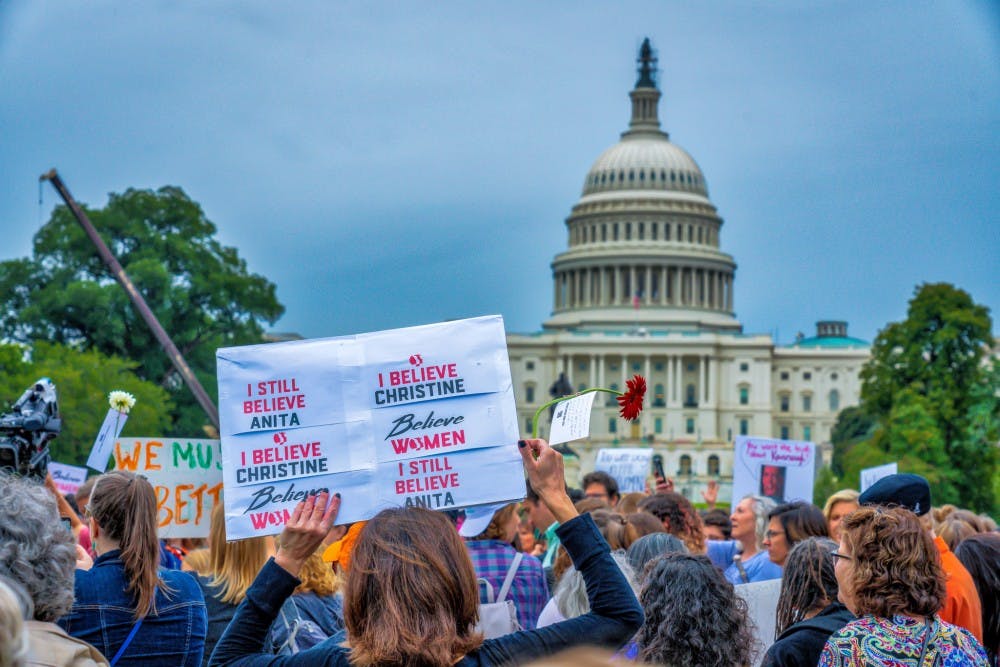AU students are speaking out against the nomination of Judge Brett Kavanaugh to the Supreme Court as his confirmation process nears an end this week.
Kavanaugh testified before the Senate Judiciary Committee last week following the reports of accusations of sexual assault and abuse during his time at Georgetown Preparatory School and Yale University. Senators took turns questioning him, as well as his central accuser, Palo Alto University professor Christine Blasey Ford, over the allegations.
For sophomore Gracie Burke, the hearing was part of a larger movement.
“We’re in the Time’s Up and #MeToo movement right now,” Burke said. “People have been listening to survivors come forward at rapid rates for almost a year and a half now and because of that charge, people are beginning to see a pattern. This isn’t just a Hollywood epidemic … It’s personal and political.”
To Burke, Kavanaugh’s case presents issues with political ideology and sexism. She said the way Republicans are fighting to get someone who is “on their side” to the Supreme Court and how Democrats are fighting to prevent his appointment is partisan.
Burke added that she believes there’s sexism in this case because men don’t automatically believe survivors of sexual assault when they say they were assaulted.
Given his credentials as a Yale Law School graduate and having served as a U.S. Circuit Judge, Burke said Kavanaugh is competent. But she added that his extreme views don’t align with most Americans.
“Now more than ever, social issues are at the forefront of Supreme Court cases, and when it comes to things like abortion rights, gay rights, and gun violence, Kavanaugh does not represent America,” Burke said.
Olan Trosky, director of communications for AU College Democrats, said a lar reason why so many people are invested in this case is because the hearings are an opportunity for elected officials to show their support for survivors.
“This goes beyond the confirmation of Kavanaugh, but how our government and our society will decide how we treat survivors,” Trosky said.
Kavanaugh’s confirmation would harm survivors of sexual assault, Trosky said, adding that many survivors feel like their voices don’t matter and the Senate approving Kavanaugh would add fuel to the fire.
“If confirmed, Kavanaugh sets the precedent that we’re not obligated to believe survivors,” she said. “We’re absolutely in a crucial moment in history with the #MeToo movement and the empowerment of women in the context of politics.”
Beyond the implications of the allegations against Kavanaugh, Trosky said Kavanaugh poses as a threat to critical issues due to his partisanship.
“We don’t want to see Brett Kavanaugh on the court because of the precedent it sets for how we treat allegations of sexual assault and how it shapes the history of our country,” Trosky said. “We are deeply concerned regarding major decisions that will likely be on the docket: abortion rights, civil rights, campaign finance and more.”
Samantha Cotter, sophomore and co-president of the National Women’s March Youth, said she tuned in to the hearings because of the deep impact they have on the future of the country.
“Any progress that has been made in women’s rights, LGBT rights, environmental preservation, and voting rights will be in jeopardy if Kavanaugh is sworn in,” Cotter said. “Generations of work to secure women’s rights in our country will be stripped away and along with it our choice.”
However, she said Kavanaugh’s allegations are not a partisan issue, but rather an issue of caring about those who choose to come forward.
“I don’t think the issue is whether or not Congress believes Ford,” Cotter said. “I believe that they simply don’t care about any of the survivors coming forward.”
Cotter agrees that the treatment of Ford has a direct parallel with the treatment of Anita Hill, who accused Justice Clarence Thomas of sexual harassment 27 years ago, in 1991. Hill also testified before the Senate Judiciary Committee, and Thomas was ultimately confirmed.
Moving forward, she remains hopeful that survivors of sexual assault will be respected but is also fearful for the future.
“Only time will tell how our country will react to sexual assault survivors speaking out,” Cotter said. “My hope for this country is that we can develop an atmosphere of belief and encouragement for survivors but I fear that may be too much to hope for.”





